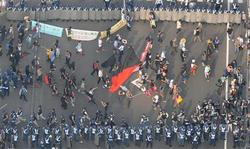Japan tightens security for G8 summit
As the Group of Eight (G8) summit is to be held in northern Japan's Hokkaido early next week, the Japanese government has mobilized the Self-Defense Forces (SDF) and police troops to tighten terrestrial, marine and aerial security both in the capital of Tokyo and around the location of the summit.
Under the command of Japanese Defense Minister Shigeru Ishiba, the Ground, Marine and Air SDF have adopted the first-class alert and are ready to "take all necessary actions."
The one-year old anti-terrorist central rapid-reaction force, which is the top elite force of the SDF and follows direct command of the defense minister, will be put into action for the first time. It is to closely cooperate with the Ground SDF to deal with all possible terrestrial terrorist attacks.

More than 20 helicopters have been in practice since mid-June for their mission to transport participating heads of states and government leaders from the New Chitose Airport, south of Hokkaido's provincial capital of Sapporo, to the summit venue of Windsor Hotel Toya at the top of a mountain besides the Toyako lake.
Troops for emergencies and possible bio-chemical attacks are also standing guard 24 hours around the clock. Being wary of missile attacks, the Marine SDF (MSDF) dispatched Aegis destroyers to waters around Hokkaido, whose air security is currently also under assistant protection of the Patriot Advanced Capacity-2 (PAC-2) facilities in nearby bases.
In the Uchiura Bay just south of the summit venue, missile-equipped MSDF vessels and frigates carrying helicopters have been in deployment.
At Chitose and Misawa bases, the Air SDF increased the number of fighter jets ready to take off at anytime and in all circumstances to be better prepared for dealing with suspicious airplanes and hijackings.
The Ministry of Land, Infrastructure, Transport and Tourism have finalized their plan to impose no-fly zone around Windsor Hotel Toya during the summit.
TWENTY-THOUSAND POLICEMEN
More than 40 heads of states and their spouses are to attend this summit, and the number exceeded that at all previous G8 practice. With this in mind, the Japanese police said their work is much tougher than that of eight years ago, when the summit was held in Japan's southernmost Okinawa Island.
Over 1,200 policemen have been designated for the protection of VIPs, doubling the number at Okinawa in 2000, the police said.
According to the summit budget of the Hokkaido Prefectural government, more than a half of the 2.2 billion yen (about 20.1 million U.S. dollars) was earmarked for security.
Besides the 5,500 Hokkaido policemen, half of the local police force, 15,000 policemen from around Japan have gathered around the Toyako lake.
From New Chitose Airport to Windsor Hotel Toya and from Toyako town to Sapporo city, an atmosphere of the highest alert and security has permeated everywhere of the possible stops of the foreign leaders.
As the police are on guard all over, visitors could be hardly seen in the popular Toyako hot spring resort.
Escort motorcades of state guests have carried out several times of practice in Sapporo city and along the highway connecting the city, the airport and the Toyako region, causing a lot of traffic jams.
SAFEGUARD AT EIGHT HUNDRED KILOMETERS AWAY
During the summit, more than 20,000 policemen would be on guard in Tokyo, about 800 km away from the summit venue.
According to the police, Tokyo is also their "major battlefield" because during the G8 summit in Britain three years ago, bomb attacks took place in London although the capital was not the venue of the meeting.
The top-level security has been implemented in Tokyo since June28. Policemen were in sight at each corner in famous business districts such as Ginza, Shinjuku and Ikebukuro, and vehicle checkpoints were set up along each main road in and around the capital.
"What we want is to impose an impression of stern air and strict security, so as to deter potential terrorists and attackers," police officials said.
According to the capital's metropolitan subway company, police dogs specialized in detecting explosives have been on duty in the large-scale public transport system since June, and the frequency of patrol and the number of security cameras have also been increased. From July 7, the first day of the three-day summit, the subway will shut all coin lockers in its facilities.
FOG COULD BE BIGGEST THREAT
The major factor behind the Japanese government's selection of the current summit venue was Windsor Hotel Toya's location at the top of a 625-meter mountain and thus easy for ensuring security.
However, according to meteorological data in the past five years, the area around the hotel was covered by fog for seven to eight days each July. If fog breaks scheduled transportation of state guests by helicopters, the police have to take them from the airport to the mountain top by vehicles, thus aggravate security burdens.
It is said that officials of the security headquarters of the summit are praying for good weather during the summit.
Source: Xinhua
Source: http://english.people.com.cn/90001/90777/90851/6442852.html



